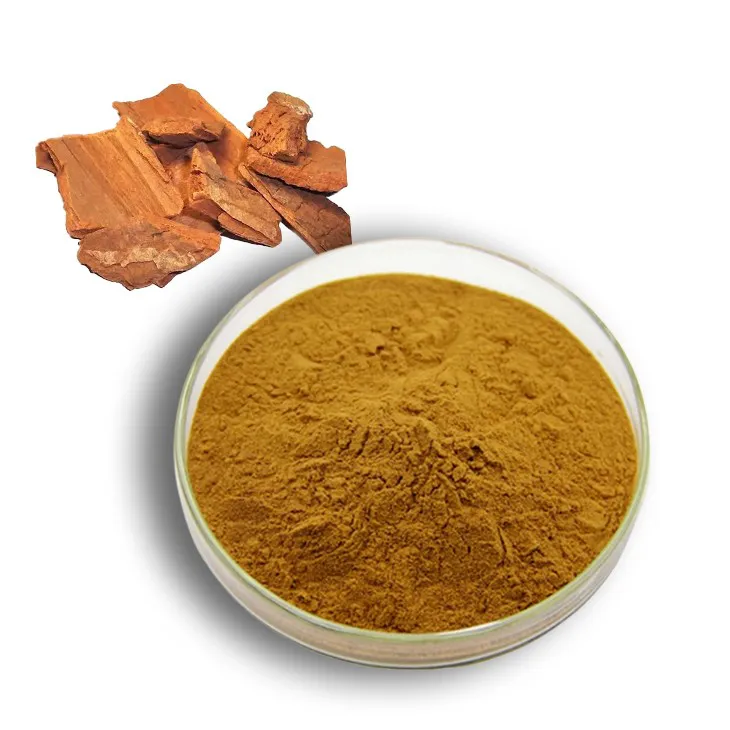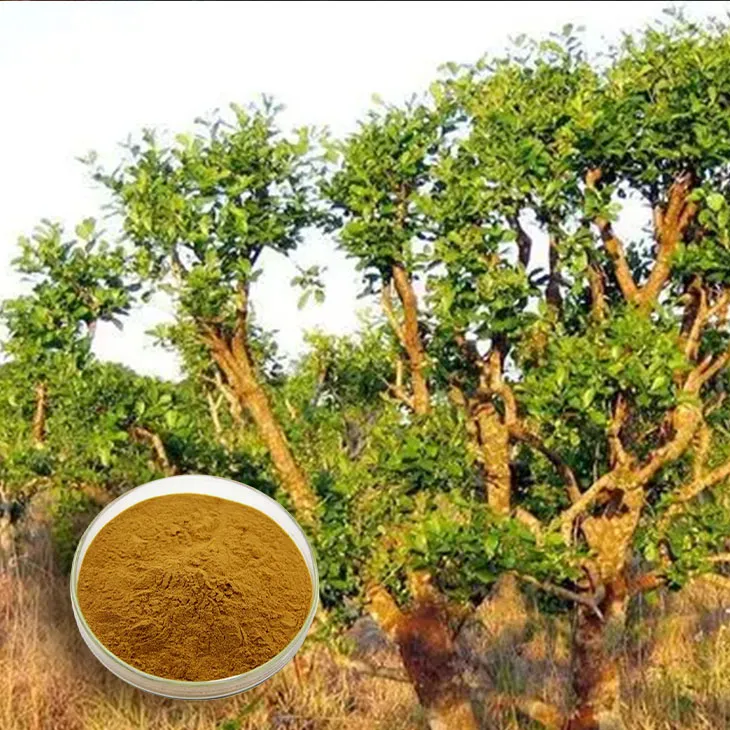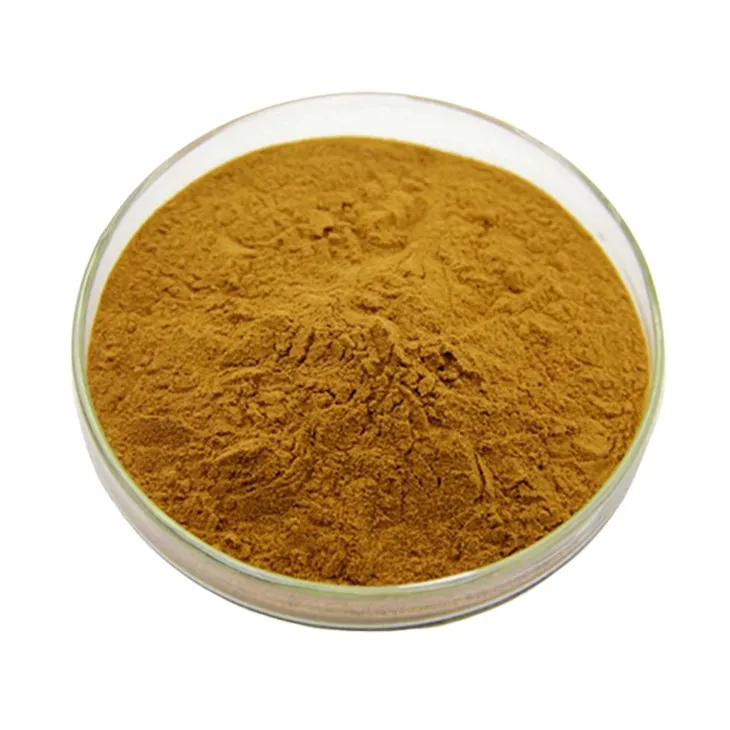- 0086-571-85302990
- sales@greenskybio.com
Benefits of Yohimbine Bark Extract in Cattle Feed.
2024-11-12

1. Introduction
In the realm of cattle farming, the search for additives that can enhance the well - being and productivity of cattle is an ongoing process. Yohimbine Bark Extract has emerged as a potentially valuable component in cattle feed. This extract, derived from the yohimbe tree, has been studied for its various effects on cattle health and performance. Understanding these benefits can provide valuable insights for cattle farmers looking to optimize their feeding strategies.

2. Stress Reduction in Cattle
Stress is a significant factor that can affect cattle in multiple ways. Cattle may experience stress due to various factors such as changes in their environment, handling procedures, or feed quality fluctuations. Yohimbine Bark Extract has shown promise in mitigating stress among cattle.
2.1. Physiological Response to Stress
When cattle are stressed, their bodies undergo a series of physiological changes. These can include increased heart rate, elevated cortisol levels, and altered immune function. Yohimbine extract can potentially interfere with the stress - related hormonal pathways. It may act on the adrenergic receptors in the body, which are involved in the stress response. By modulating these receptors, yohimbine can help to prevent the excessive release of stress hormones. For example, in a study conducted on a group of stressed cattle, those fed with yohimbine - supplemented feed showed a significant reduction in cortisol levels compared to the control group.
2.2. Behavioral Indicators of Stress Reduction
Stress can also be manifested through the behavior of cattle. Stressed cattle may show signs such as restlessness, reduced feed intake, and increased aggression. The addition of Yohimbine Bark Extract to the feed has been observed to improve the behavior of cattle. They tend to be more calm and exhibit normal feeding and resting patterns. This is beneficial not only for the well - being of the cattle but also for the ease of management on the farm. For instance, farmers have reported that cattle fed with yohimbine - enriched feed are easier to handle during milking or transportation, as they are less likely to be agitated.

3. Muscle Mass Development
Another important aspect of yohimbine bark extract in cattle feed is its potential role in muscle mass development. This is of particular interest in the beef industry, where muscle mass directly correlates with the quantity and quality of beef produced.
3.1. Influence on Protein Metabolism
Yohimbine may influence protein metabolism in cattle. It has been suggested that it can enhance the uptake of amino acids by muscle cells. Amino acids are the building blocks of proteins, and increased amino acid uptake can lead to greater muscle protein synthesis. This process is crucial for muscle growth and development. In laboratory experiments, it has been observed that muscle cells exposed to yohimbine extract in vitro showed an increased rate of amino acid incorporation into proteins.
3.2. Effect on Muscle Fiber Type
Cattle muscle is composed of different fiber types, including slow - twitch and fast - twitch fibers. Yohimbine bark extract may have an impact on the proportion and characteristics of these fiber types. It has been hypothesized that yohimbine can promote the development of fast - twitch muscle fibers, which are associated with greater muscle mass and power. This can result in cattle having more developed musculature, which is highly desirable in beef production. Studies are currently underway to further investigate this aspect and determine the exact mechanisms by which yohimbine affects muscle fiber types in cattle.

4. Influence on Metabolic Rate
The metabolic rate of cattle plays a crucial role in their overall health and productivity. Yohimbine bark extract can have a favorable influence on the metabolic rate of cattle.
4.1. Energy Metabolism
Yohimbine may enhance energy metabolism in cattle. It can potentially increase the breakdown of stored fats and carbohydrates, releasing more energy for the body to use. This can be beneficial especially during periods of high energy demand, such as growth, pregnancy, or lactation. For example, in lactating cows, a more efficient energy metabolism can lead to increased milk production as the body has more energy available to support milk synthesis. Additionally, by promoting fat breakdown, yohimbine can also help in maintaining a healthy body condition in cattle, preventing excessive fat deposition.
4.2. Nutrient Absorption and Utilization
This extract can also improve nutrient absorption and utilization in cattle. It may enhance the function of the digestive tract, allowing for better absorption of essential nutrients such as vitamins, minerals, and other feed components. This, in turn, can support the overall metabolic processes in the body. For instance, better absorption of minerals like calcium and phosphorus can contribute to stronger bones and better overall body structure in cattle.

5. Considerations and Future Research
While the benefits of yohimbine bark extract in cattle feed are promising, there are several considerations that need to be taken into account.
5.1. Dosage and Safety
Determining the appropriate dosage of yohimbine extract is crucial. Excessive amounts of yohimbine may have adverse effects on cattle health. Therefore, more research is needed to establish the optimal dosage levels that can provide the desired benefits without causing harm. Additionally, long - term safety studies are required to ensure that continuous use of yohimbine - supplemented feed does not lead to any unforeseen health issues in cattle.
5.2. Quality Control of the Extract
The quality of the yohimbine bark extract used in cattle feed is also of great importance. There should be strict quality control measures in place to ensure that the extract is pure and free from contaminants. Variations in the quality of the extract can affect its efficacy and safety. Standardized extraction methods and quality testing procedures need to be developed and implemented to ensure consistent results.
5.3. Future Research Directions
There are still many aspects of yohimbine's effects on cattle that require further investigation. For example, more in - depth studies on its long - term effects on cattle health and reproduction are needed. Additionally, research into the potential interactions between yohimbine and other feed additives or medications commonly used in cattle farming is essential. Understanding these interactions can help in formulating more effective and safe feeding regimens for cattle.
6. Conclusion
In conclusion, yohimbine bark extract shows great potential as an additive in cattle feed. Its ability to reduce stress, contribute to muscle mass development, and influence the metabolic rate in a favorable way makes it an interesting option for cattle farmers. However, further research and careful consideration of dosage and quality control are necessary to fully realize its benefits and ensure the safety and well - being of cattle. As the field of cattle nutrition continues to evolve, yohimbine bark extract may play an increasingly important role in optimizing cattle production and quality.
FAQ:
1. What is yohimbine bark extract?
Yohimbine bark extract is a substance derived from the bark of the yohimbe tree. It contains certain compounds that can have various effects on biological systems, such as those in cattle.
2. How exactly does yohimbine bark extract reduce stress in cattle?
Yohimbine bark extract may interact with the cattle's nervous system. It could potentially modulate the release of stress - related hormones or neurotransmitters, thus helping the cattle to be more relaxed and less likely to experience stress - induced negative impacts on their health and productivity.
3. Can yohimbine bark extract have any negative effects on cattle?
While yohimbine bark extract has potential benefits, improper use or excessive amounts could lead to negative effects. It might cause over - stimulation in some cases, leading to restlessness or other abnormal behaviors. Also, it needs to be carefully dosed as incorrect dosages could potentially disrupt normal physiological functions in cattle.
4. How much yohimbine bark extract should be added to cattle feed?
The appropriate amount of yohimbine bark extract in cattle feed depends on various factors such as the age, weight, and overall health of the cattle, as well as the specific goals of supplementation. It is usually determined through careful research and experimentation. In general, it should be added in small, carefully measured amounts to avoid over - supplementation.
5. Is yohimbine bark extract legal to use in cattle feed?
The legality of using yohimbine bark extract in cattle feed varies by region. Some areas may have strict regulations regarding its use due to potential impacts on animal health and food safety. It is essential for farmers and feed manufacturers to be aware of and comply with local laws and regulations.
Related literature
- The Effects of Yohimbine on Cattle Physiology"
- "Yohimbine in Livestock Nutrition: A Comprehensive Review"
- "Beneficial and Adverse Effects of Yohimbine in Cattle Feeding"
- ▶ Hesperidin
- ▶ citrus bioflavonoids
- ▶ plant extract
- ▶ lycopene
- ▶ Diosmin
- ▶ Grape seed extract
- ▶ Sea buckthorn Juice Powder
- ▶ Beetroot powder
- ▶ Hops Extract
- ▶ Artichoke Extract
- ▶ Reishi mushroom extract
- ▶ Astaxanthin
- ▶ Green Tea Extract
- ▶ Curcumin Extract
- ▶ Horse Chestnut Extract
- ▶ Other Problems
- ▶ Boswellia Serrata Extract
- ▶ Resveratrol Extract
- ▶ Marigold Extract
- ▶ Grape Leaf Extract
- ▶ blog3
-
High purity olive leaf extract
2024-11-12
-
Lavender oil extraction method
2024-11-12
-
100% organic virgin sea buckthorn fruit oil
2024-11-12
-
Lotus leaf extract powder factory in China
2024-11-12
-
China aged garlic extract supplier
2024-11-12
-
Deer antler extract powder manufacturer
2024-11-12
-
Saw palmetto extract vs whole herb
2024-11-12
-
Rose Hip Extract
2024-11-12
-
Boswellia Serrata Extract
2024-11-12
-
White Peony Extract
2024-11-12
-
Buckthorn bark extract
2024-11-12
-
Chia Seed Powder
2024-11-12
-
Thunder God Vine Extract
2024-11-12
-
Almond Extract Powder
2024-11-12
-
Fig Extract
2024-11-12
-
Mulberry Extract
2024-11-12
-
Berberis aristata Extract
2024-11-12





















